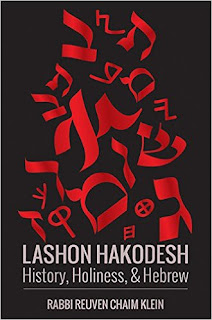God versus Gods: Judaism in the Age of Idolatry
by
Rabbi Reuven Chaim Klein
Mosaica Press / 398 PP
SPECIAL GUEST POST
Reviewed by Rabbi Naftali Kassorla
The Torah world can once again rejoice,
as one of its rising stars, Rabbi Reuven Chaim Klein, the author of Lashon HaKodesh: History, Holiness, &
Hebrew has produced another impressive work in God versus Gods: Judaism in the Age of Idolatry.
In this work, Rabbi Klein draws upon
copious amounts of sources, and years of immersion in Torah Study, to present
both the historical/sociological history of idol worship, the development of
polytheistic cults from primeval monotheism, and the extent of their worship in
ancient times.
But most importantly, Rabbi Klein
tackles an important issue that is riddled with much confusion: To what extent
were the the Jews of the First Temple period and earlier, truly steeped in the
practices of Avodah Zarah?
The plain reading of Tanach and the prophets’ exhortations
seem to imply that idol worship was rife within the Jewish people. Yet, given
our nation’s unique history, most people find this befuddling. We know our
history; we know the amount of persecution that the Jewish people have endured,
the embers of flames we have faced, and the forced exiles we have experienced
under the threat and ultimatums of conversion or death. Yet, we know how we,
collectively, have faced these trials with strength and faith. Thus, how could
the fiber of this nation, that we see has been strong for millennia, possibly
cower and break down in the times of prophecy and the daily miracles of the
Temple? Surely there is something deeper going on here.
With these questions in mind, I found
that Rabbi Klein was quite intuitive and methodical in addressing this issue
outright in his introduction (pg. 17). Basing himself on both the Doros Ha-Rishonim, written Rav Yitzchak
Isaac Halevi Rabinowitz, and the sermons of the late Rav Isaac Sher, Rabbi
Klein sets down both a defense of the Jewish People in the First Temple period,
but also gives us a working philosophy and narrative with which to properly
understand the historical and literary parts of Tanach.
They support an alternative approach:
we mustn’t take the words of the prophets at their simple meaning, for actually
the prophets’ harshness is attributed to both the seriousness of idol worship,
and a higher expectation of the Jewish people of the time.
Not only does this answer the question
posed above, but I found it actually enriched my understanding of the
seriousness of idol worship, and in contrast the unique nature of the Torah’s
vision of the world - a God-centered society - without any medium separating us
and the Divine.
This idea is brought out to the fore
later in the book (pg. 45). We are introduced to Avraham Avinu, our biological
progenitor and spiritual forefather of pure monotheism. The society into which
he is born is one that is heavily demarcated and defined. There were numerous
sects of religions, each with its own sets of belief and ways of worship. It is
a society that is both rigid in its hierarchy, its conception of the pantheon
of gods, but also in the caste patriarchal system of leaders of and followers.
Everyone knew their role, and it was almost non-negotiable.
Yet Avraham, through the means of
inquiry, challenged this system, and is promptly met with Nimrod’s threats of
death by fire. Rabbi Klein thrills us with accounts of Avraham’s face off with
Nimrod, and how Avraham challenged the status quo (pg. 48). Not only was Nimrod
the archetypical war-lord, but he also thought of himself as a deity.
Avraham, through his publicizing
monotheism, boldly went where no man went before. His conception of monotheism
was meant to democratize the ability to connect with the Divine -- the way it
was intended from the time of creation -- without a medium, without a self-proclaimed
god lording over us. Instead, Avraham preached that everyone can have a
personal recognition and relationship with the Creator of the World.
Once we appreciate this message, the
theme presents itself. In Jewish Tradition, dabbling, or even a subtle
acknowledgment of idol worship is treated with the utmost seriousness, for it
reverts the world back to the drudgery of the spiritual Dark Ages, a time when
it was accepted as fact that one could not approach G-d with his concerns or
fears, and when the belief that what was decreed from Above was immutable.
But the Torah’s vision of man's
relationship with God is on a totally different plane -- there are no
intermediaries, no go-between, and there are no powers above the power of God.
One can approach Him in seeking a true relationship with Him.
Rabbi Klein does an immaculate job at
presenting us with the different approaches to understanding the history of how
the battle between idol worship and monotheism played out. It is worthy to be
added to anyone’s bookshelf. I found his book enlightening, intriguing, and
entertaining, and I strongly suggest it to others as well.
To order: https://amzn.to/2NO4jLy
To order: https://amzn.to/2NO4jLy
Rabbi Naftali Kassorla is the Director of Kollel Toras Chaim and a Maggid Shiur at Yeshivas Tiferes Yisroel both in Jerusalem


